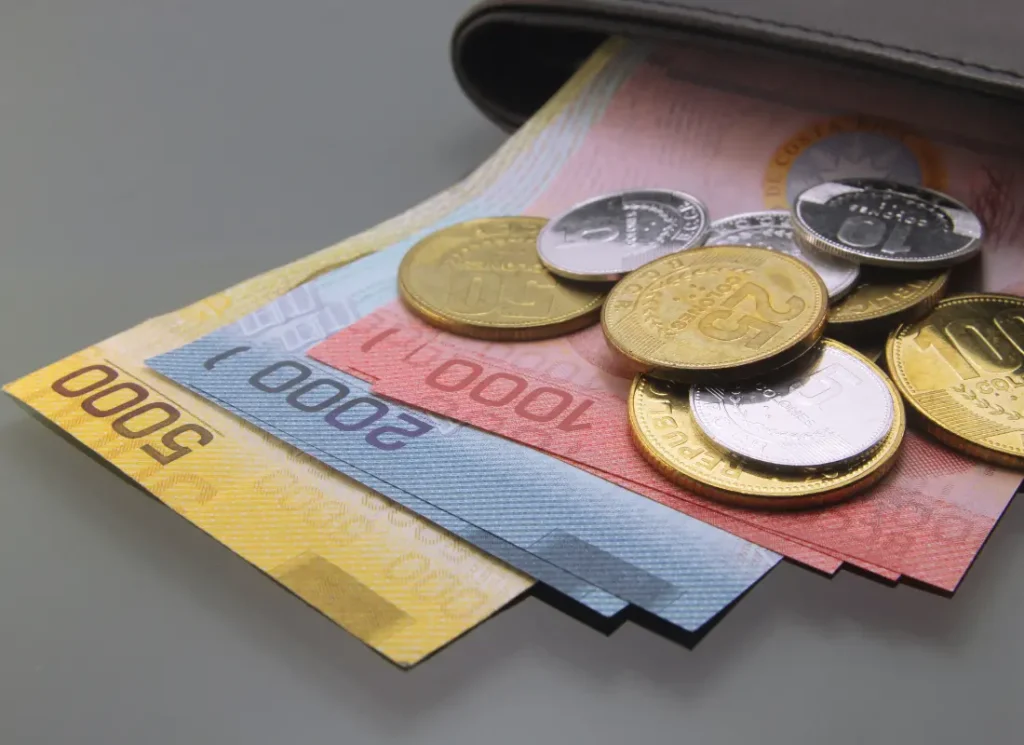What’s the official currency of Costa Rica? Is it better to use Colones or US Dollars? Can I pay on card? Where’s the best place to get cash? and more answers…
If you’re travelling in Central America, check out my full guide to currencies & money in Central America
An Introduction to the Costa Rican Colón
In Costa Rica there are two currencies that are commonly used, and both are legal tender in almost all situations. They are the Costa Rican Colón (plural: Costa Rican Colones) and the US Dollar. Despite the success of the US Dollar in recent years, Costa Rican Colones have gained value against the dollar over the last few years, which is one of the reasons that Costa Rica is becoming an increasingly expensive country to visit!
In fact, it’s one of the most expensive countries in Latin America.
When I went to Costa Rica in 2021, you could buy around 700 Colones for 1 US Dollar. Now, at the beginning of 2024, you get just 520 to 1 USD. These figures are very approximate, and just meant to give you a guide. Exchange rates can change at any time, and they will probably have changed by the time you’re reading this! Please always check the official exchange rate at the time before you accept any monetary conversion.
Click here for the current USD to Colones exchange rate.
When you’re in Costa Rica, if you pay with US dollars in cash then you will almost always be given your change in Colones. This can actually be a useful way to get some small change if you don’t want to make a cash withdrawal!
The History of the Costa Rican Colón
Fun fact: The Costa Rican Colón was actually named after Christopher Colombus (Cristóbal Colón in Spanish).
In the early years of Spanish colonisation, Costa Rica went through the same changes as many other countries and currencies in Central America. It wasn’t until the very end of the 19th Century that Costa Rica established their own national currency (and asserting their economic independence, ironically, by naming their currency after their coloniser).
As Costa Rica has grown and developed, the Colón has gone through many designs and iterations. It’s design now features a number of national symbols and landmarks.
It’s clear to see from its value that the Colón has gone through various periods of inflation, but it is now considered a relatively stable currency.
Read more about Costa Rica: Is it Safe to Travel Alone in Costa Rica?
What’s the Best Way to Get Cash in Costa Rica?
You can withdraw cash for free at Banco de Costa Rica (BCR) ATMs and Banco Popular ATMs. There may be other banks or ATM services that are free, so always check!
However, beware, because some cash machines come with hefty fees. I once ended up paying 8$ to withdraw cash inside a hospital when I was in a rush because their card machine wasn’t working!
Most cash machines give you the option of withdrawing Colones or US dollars, although in especially touristy areas they can run out of dollars. This is especially true for places close to the border with Panama, such as Puerto Viejo, because in Panama it costs a minimum of 6$ per transaction to withdraw cash! Sometimes it’s a good idea to take out cash before you travel to Puerto Viejo.
As always: be sure to check with your bank if they are going to charge you for foreign transactions or for withdrawing cash abroad!
Is it Best to Use Colones, US Dollars or Card in Costa Rica?
Costa Rica is one of the most well-developed countries in Central America, and as a result you’ll find that you can pay with credit or debit card just about everywhere. Even better; there’s usually no additional fee.
There is an official exchange rate that is generally adhered to, so you don’t need to worry too much about getting ripped off depending on whether you pay in Colones or US dollars. If you come from a country that doesn’t use US Dollars, it’s worth checking to see if your bank gives you a better rate paying Dollars or to Colones, taking into account the Dollar/Colon exchange rat at the time.
The only places where you will need cash are the markets and the buses. Markets generally accept both Colones and Dollars, but it’s best to have Colones just in case. On the local buses, they will only accept Colones in cash – no card or dollars!

